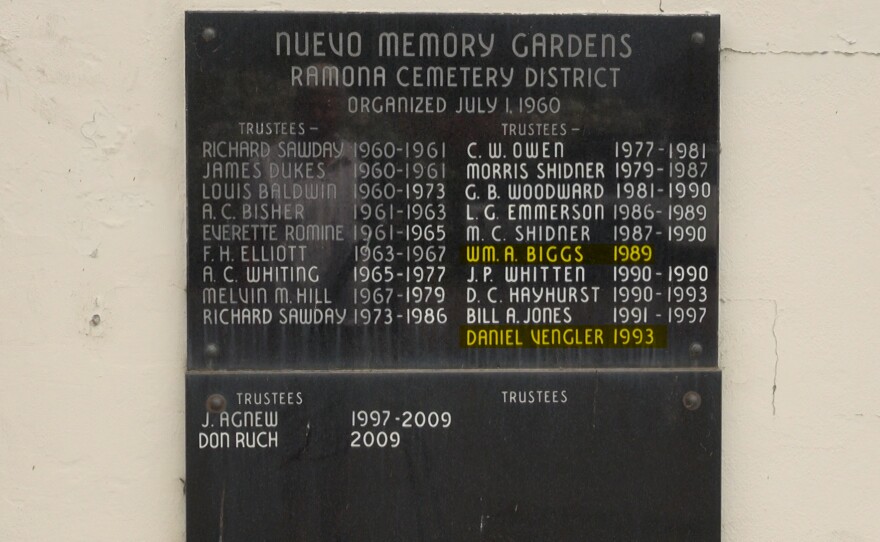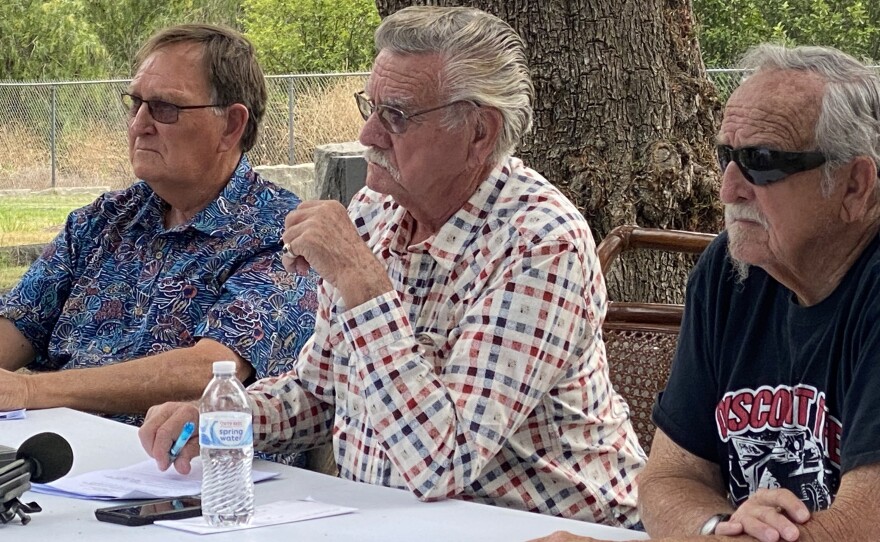Pete Smith is a throwback. The 71-year-old longtime Ramona resident doesn’t engage with anyone on social media, but he’s a big believer in civic engagement.
One of the ways Smith serves is by sitting on the San Diego County Audit Committee, which reviews the work of county auditors. It was while doing this work in October of 2020 that he came across an audit report on the Ramona Cemetery District.
The district’s sole responsibility is to operate the Nuevo Memory Gardens, a 10-acre cemetery that opened in 1893 and is the final resting place for more than 1,000 souls.
The auditor noted that the district had been paying for the health benefits of two of its part-time trustees for years. All told, the district had shelled out more than $400,000 since 2011 to pay the insurance premiums for William Biggs and Daniel Vengler.

A plaque adorning the entrance to the cemetery shows Biggs had served on the board for 34 years and Vengler for 30 years. They might be the longest-serving members of a public board in all of California, said a good government expert.
"I have never heard of anyone serving this long," said Robert Stern, who is a co-author of the state’s 1974 Political Reform Act. "That is way too long for someone to serve on the board of a taxpayer-funded agency."
Stern said neither the district nor the trustees have done anything illegal, but it’s not good governing. Yet, he’s not surprised it happened, he said, because "very few people pay any attention to special districts."
Lots of districts, little accountability
Ramona’s cemetery district is one of 3,300 operating statewide and 58 in San Diego County, all supported by property taxes. They are responsible for a range of infrastructure and services, including sewers, water and fire protection.
Stern said unless someone is actively monitoring these special districts, "they get away with whatever they want to."
And "whatever they want" is what this cemetery board has been doing, Smith said.
The audit report on the Ramona district was forwarded onto the San Diego County Grand Jury, which is the body responsible for investigating such findings. Smith said nothing changed as he continued to keep tabs on the district.
"My biggest concern as a taxpayer is how this money is being used," Smith said.

KPBS confirmed through the California State Controller’s website that Biggs and Vengler approved health coverage for themselves in a cemetery board meeting in 2011, and since then, the district has paid for health benefits on their behalf totaling $402,123.
Reviews of the other cemetery districts in San Diego County revealed that they don’t pay their trustees health benefits. These include the North County, Pomerado, and Valley Center cemetery districts
Vengler received $34,800 in health care benefits — the single largest payout in 2021 for any special district trustee in the county, except for the large hospital districts, according to the State Controller’s website.
Smith also discovered that the $34,800 paid to Vengler "is greater than a maintenance worker's and the district manager's salary."
Vengler attends a monthly meeting typically lasting one hour to qualify for the benefit. That's the same for Biggs, for whom the district paid $15,168 in health premiums in 2021, according to the records.
Biggs and Vengler were continually reappointed during the 28 years of Supervisor Dianne Jacob's tenure in office. Joel Anderson succeeded Jacob in 2021 and also reappointed them.
"You know, I was shocked to learn what you learned," Anderson said when KPBS showed him Smith’s findings.
He acknowledged that the county’s options are limited with special districts.
"We're actually doing the research on what we can and cannot do," Anderson said. "I made some of these appointments back in 2021 when I first got elected, and nobody else applied. There were no complaints and I had no idea."
A surprise ending
Smith first attended a district board meeting in June, which is when he told the board about the audit report’s findings. The trustees told him he needed to provide proof of his claims.
Smith came back for the board’s Aug. 4 meeting. This time, he brought with him more records and a reporter from KPBS. At first, the board members were skeptical and didn’t seem to know who received what payments.
But then Vengler made a surprise motion. He said the board should give employees a 5% raise and cease paying for his and Biggs’ health benefits.
"We want to reverse a motion that was made in 2011," Vengler said.
Biggs said he didn’t want to move forward until he checked his health insurance options with the Social Security office.
The cemetery district board met again last week in a special session. They acted on the proposals Vengler made at the previous meeting. Then Vengler went a step further. He paid back his insurance benefits with two checks totaling $303,658 made out to the cemetery district.
Smith said he’s happy with how things turned out, but wishes it wouldn’t have taken so long.
"I worked on this for a long time but didn‘t get any real traction until an investigative reporter got involved and television cameras showed up," he said. "In hindsight, my mistake was not getting an investigative reporter involved a year and a half ago."
And, Smith said, he "was very surprised (Vengler) paid back the $300,000 so quickly."
He is now wondering if Biggs is going to do the same.




